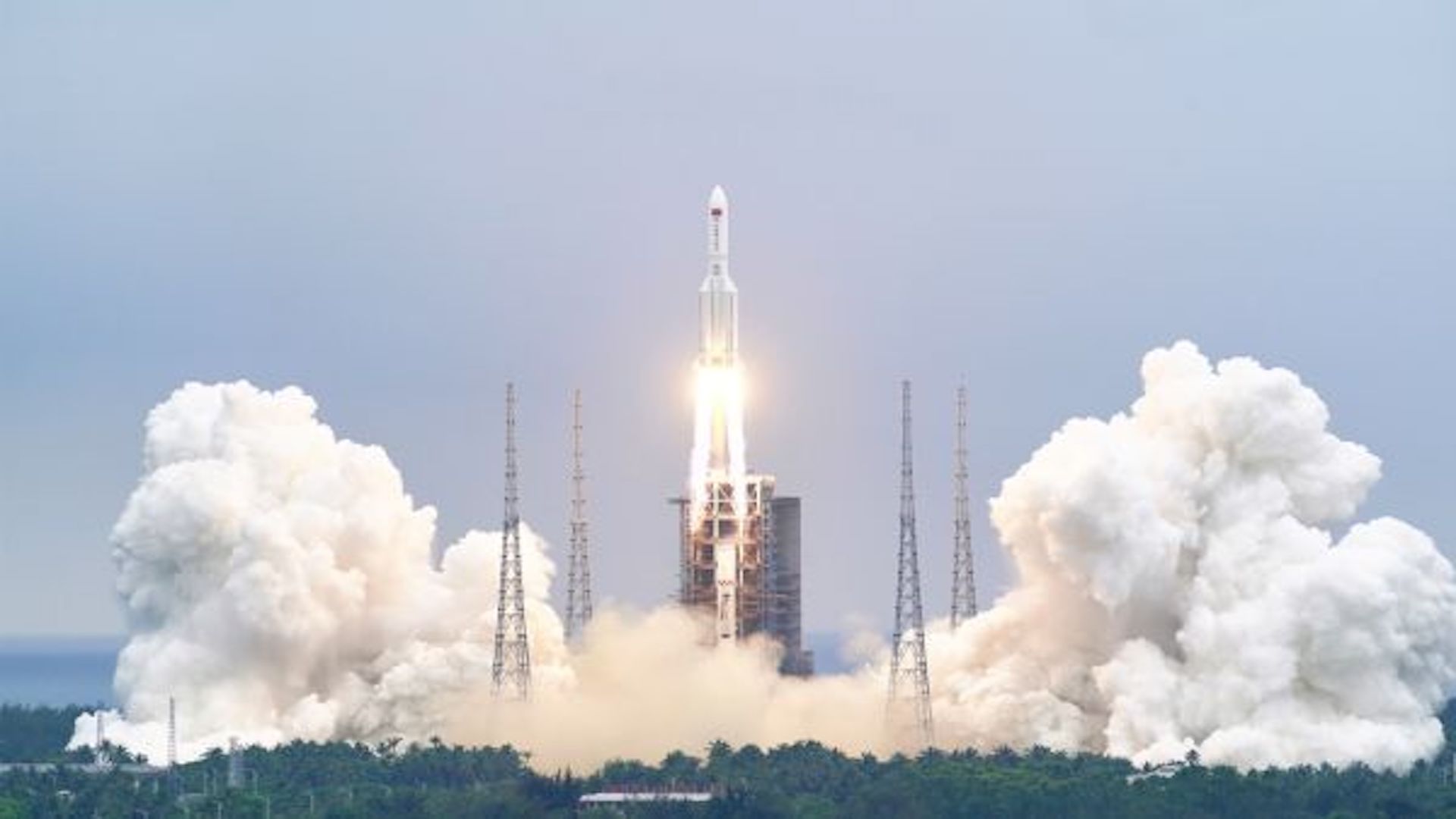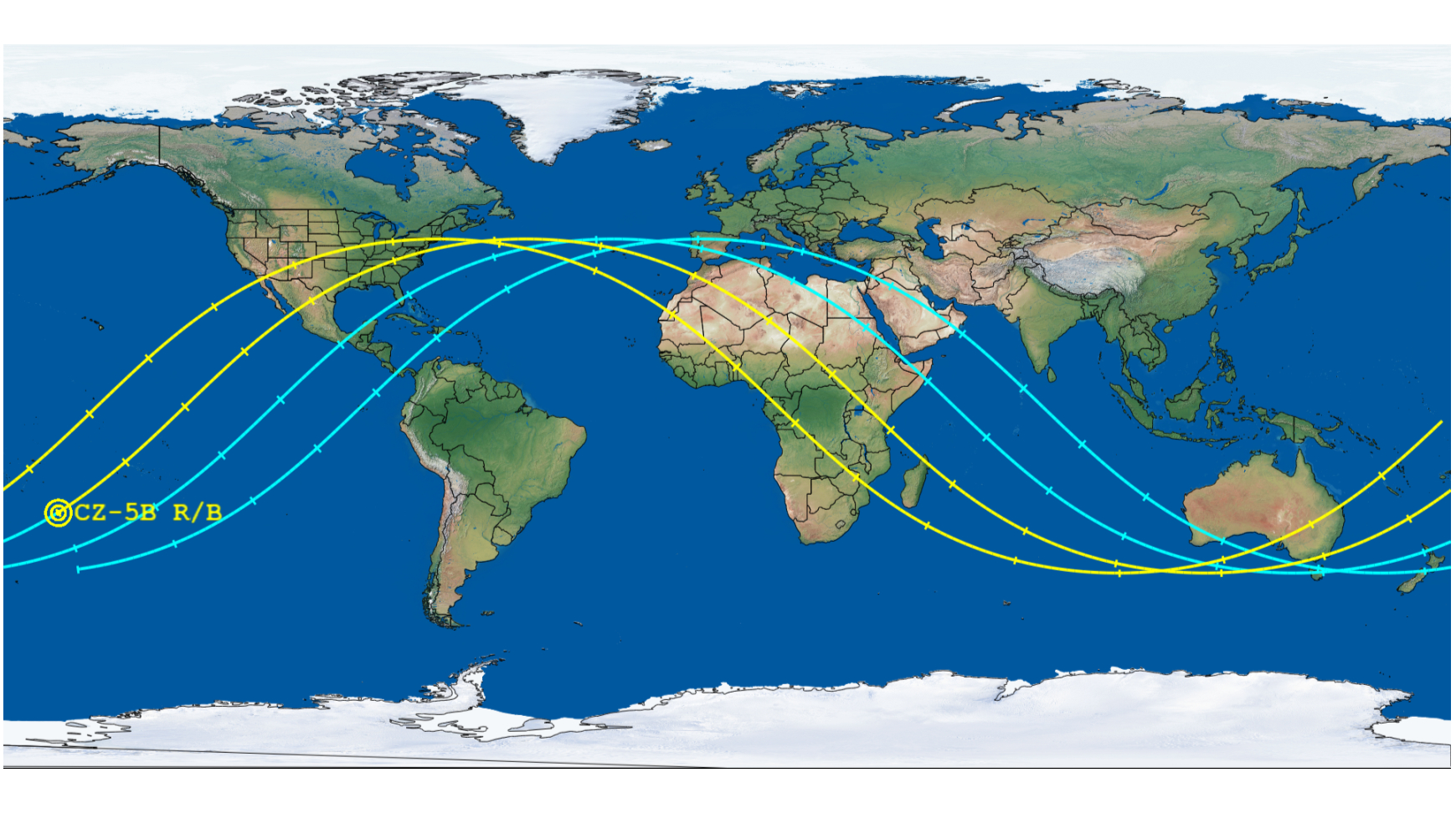Should we really be worried about China's uncontrolled rocket booster reentries?
The rocket had been circling the Earth since Halloween
Debris from the core stage of a Chinese rocket has splash-landed in the Pacific Ocean after splitting in half on its uncontrolled descent back to Earth. Splashdown is part of a growing trend, in which China lets its space junk crash to Earth in uncontrolled reentries.
One chunk of the 25-ton (23 metric tons) Chinese Long March 5B rocket stage, which launched Oct. 31 to deliver the third and final module to the Tiangong space station, plopped down in the south-central Pacific at 6:01 a.m. ET on Nov. 4, the United States Space Command wrote in a tweet. A second atmospheric reentry was also recorded over the Northeast Pacific, with one space expert speculating that wreckage could have made it to Puerto Escondido in Oaxaca, Mexico, or even Mexico's Tabasco province.
This is the fourth time in two years that China has disposed of its rockets in an uncontrolled manner. The previous landings saw metallic objects rain down upon villages in the Ivory Coast, debris drop in the Indian Ocean near the Maldives, and rocket chunks crash dangerously close to villages in Borneo. All of this booster appears to have landed safely in the Pacific, but that doesn't mean it had no repercussions: 300 flights over northeastern Spain, including the cities Tarragona, Barcelona and Reus and the island of Ibiza, were delayed for 40 minutes to reduce any risk of colliding with the rocket remnants.
Related: The biggest spacecraft ever to fall uncontrolled from space
"Once again, the People’s Republic of China is taking unnecessary risks with the uncontrolled rocket stage reentry of their Long March 5B rocket stage. They did not share specific trajectory information which is needed to predict landing zones and reduce risk," NASA Administrator Bill Nelson said in a statement. "It is critical that all spacefaring nations are responsible and transparent in their space activities and follow established best practices, especially, for the uncontrolled reentry of a large rocket body debris – debris that could very well result in major damage or loss of life."
Ted Muelhaupt, a consultant for the Aerospace Corporation, a U.S. government-funded nonprofit research center based in California, said that though it was common for space objects, such as disused satellites, of around a ton (0.9 metric tons) to rain down on Earth, the mass of the Long March 5B rocket debris means that not enough of it will burn up in the atmosphere.
"The thing I want to point out about this is that we, the world, don’t deliberately launch things this big intending them to fall wherever. We haven’t done that for 50 years," Muelhaupt said in a Nov. 3 news conference. "All the large reentries that have been uncontrolled in the last 50 years, except for these, were accidents — something went wrong; it wasn't supposed to happen."
Breaking space news, the latest updates on rocket launches, skywatching events and more!
Booster stages are usually the biggest sections of a rocket, making them less likely to completely burn up on reentry. As a consequence, engineers try to aim rockets so that their booster sections are steered into the ocean. If, on the other hand, the boosters make orbit, some are designed to fire a few extra bursts from their engines to steer them back into a controlled reentry.
But the Long March 5B booster engines can only fire once, so that boosters used for missions near to Earth enter a doom spiral above our heads before landing in an unpredictable location.
China has insisted that uncontrolled reentries are common practice and has dismissed concerns about potential damage as "shameless hype." In 2021, Hua Chunying, then-spokesperson for the Chinese Ministry of Foreign Affairs, accused Western reporting of bias and "textbook-style double standards" in its coverage of China's falling rockets. For instance, in March 2021, debris from a falling SpaceX rocket smashed into a farm in Washington state — an event Hua claims Western news outlets covered positively and with the use of "romantic words." A year later, in August 2022, a second set of SpaceX debris landed on a sheep farm in Australia.
As the rocket's debris path flitted over roughly 88% of the world's population, it did put the odds of harm far above the internationally accepted casualty risk threshold for uncontrolled reentries of 1 in 10,000. Nonetheless, the odds that someone will be harmed by a falling rocket are thankfully small (ranging from 1 in 1,000 to 1 in 230) and the risk to single individuals are even lower (between 1 in 10 trillion and 1 in 6 trillion), according to The Aerospace Corporation.
"You're 80,000 times more likely to get hit by lightning, so no, don't worry about it," Muelhaupt said.
Christopher Newman, a professor of space law and policy at Northumbria University in London, said all of the major launch nations will have parts of space objects that return to Earth in an uncontrolled manner, but establishing an international consensus on how to deal with them is difficult given current geopolitical tensions.
"This is a problem that needs an international solution, especially as objects such as rocket bodies are three times more likely to impact on cities in the 'Global South,'" Newman told Live Science. "Yet we only have to look at the attitude of countries to space tracking and space situational awareness, as well as the debris problem in Earth orbit, to see that the international community is not yet motivated to try and solve this issue.
"As a lawyer, it is clear to me that momentum for change only comes when there is some form of disaster or tragedy — and by then it is often too late," he said. "The warnings are there for all users of space; the question is whether they will take action now to deal with them."
Muelhaupt hopes that by discussing the problems caused by Long March 5B rockets now, norms of behavior could be established to push for better rocket designs.
"We can't approach this sort of thing through laws and and treaties and the like, that's really hard. But if there is an accepted norm of behavior: That you don't do this, you do this, don't do that. That can kind of come from the ground up," he said. "And so for the next time they make a design like this, we're hoping that they will take the reaction to this one into account and make the design changes."

Ben Turner is a U.K. based staff writer at Live Science. He covers physics and astronomy, among other topics like weird animals and climate change. He graduated from University College London with a degree in particle physics before training as a journalist. When he's not writing, Ben enjoys reading literature, playing the guitar and embarrassing himself with chess.



